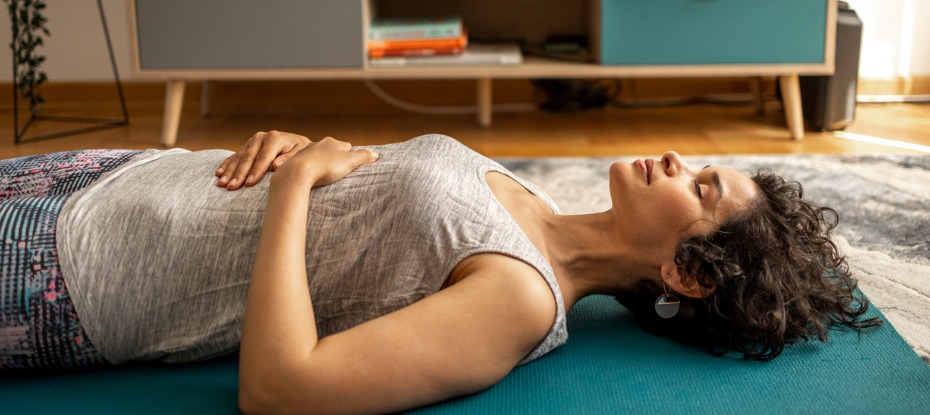
What is Mindfulness Meditation?
Meditation is about training your brain to achieve a state of calm concentration and positive emotions. It's not about clearing thoughts or setting your mind in blank. Mindfulness is a term to describe a relaxed state of being where a person isn’t reactive or overwhelmed by the external environment. Mindfulness comes to us easier when practised regularly. There are several types of meditation; mindfulness meditation is just one type.
Mindfulness meditation is having an increased level of awareness of the present moment. During meditation, the focus is on the experienced sensations, emotions, and thoughts. Sensations have to do with the external environment as they start with the physical body and move up to the brain and may include the breeze or surrounding smells. Emotions (or feelings) rise in the brain and move down to the body, and can include love, fear, sadness, etc. Last, thoughts may be ideas or opinions you observe but decide to pass without considering or judging.
There are many reported benefits of regular mindful meditation. The benefits include stress relief, reduced anxiety, improved cognition, reduced pain, controlling high blood pressure, reduced inflammation, improved mood, increased focus, and reduced tobacco cravings.
The side effects of meditation are considered low risk, but for people with a history of mental illness meditation may trigger increased anxiety, dizziness, intense mood changes, depersonalisation, and derealisation. To avoid these effects opt for guidance during your initial practices.
How to Practice Mindfulness Meditation
The instructions for mindfulness meditation can seem very simple, but it can take time and patience to master the technique. The important thing here is to keep trying. Find your preferred methods and trust you will feel the benefits. You can start with the following method:
- Sit or lie in a comfortable position without distractions and close your eyes.
- Focus on your breathing. Inhale for 10 counts, then exhale for 10. Repeat 5 times.
- Inhale and tense your body, then relax and exhale. Repeat 5 times.
- Keep coming back to your breath.
- Focus on the different parts of your body. If any body part feels tight or tense, relax.
- When a thought comes to mind, acknowledge it and let it pass. Once again, focus on your breathing.

Benefits of Mindful Meditation for Mental Health
Stress and anxiety can come in multiple ways, forms, sizes, and dimensions. No two people feel stressed or anxious the same way. When there is a lot going on, and things get piled in our heads, it's very easy to get overwhelmed and perceive small bumps as big stressors. In no time, the result is even greater stress, which can take a toll on our mental and physical health. Being in a constant state of alertness enables the fight or flight response, known as allostatic load, which can be helpful when you need a burst of energy to perform at your best, but not all the time. The burst of energy is created through increased blood flow, increased metabolism, brain activation, and the body’s preparedness to repair any tissue that may be injured in a physical battle. However, these symptoms can be harmful from long-term activation. Mindful meditation can help us turn off the fight-or-flight response and better cope with daily stressors.
Anxiety and Depression
Mindfulness meditation can also help us control negative thoughts and emotions rather than being controlled by them. It may also decrease levels of inflammatory cytokines, which can contribute to depression. Cytokine chemicals are released in response to stress and can impact mood.
Mindfulness-based Cognitive Therapy (MBCT) can improve the relapse rate (according to a study from 78% to 36%) for people who have experienced three or more episodes of depression. It works by changing the relationships of negative thoughts and emotions.
Moreover, mindfulness can reduce anxiety and depression symptoms and somatic distress in teens while increasing self-esteem and sleep quality.
Some people use mindfulness meditation to help calm their mind and body and as a relaxation technique for panic disorder or anxiety. It can take time to learn the technique, and it is normal to feel more anxious in the early days about practising meditation correctly, but you may find those practices help reduce how often you overthink events or feel anxious during the day.
Pain
The connection between mind and body is particularly strong when it comes to chronic pain. Mindfulness meditation can significantly reduce pain, fatigue, and sleeplessness in people with chronic pain syndromes. Within a 10 week period significant reductions were observed in present-moment pain, negative body image, inhibition of activity by pain, symptoms, and mood disturbance.

Relax & Reduce Stress Levels
A US survey of 34,000 adults reported that 92% of participants meditated to relax or reduce stress. Part of the reason may be that people who do MBCT regularly are better able to focus on the present and not worry or dwell on negative thoughts.
Sleep
Mental health and sleep are also closely connected. In the same US study, more than half of respondents said they practise mindfulness meditation for better sleep. By relaxing the body, releasing tension, and entering a peaceful state, you’re more likely to fall asleep. It can be hard to fall asleep when you’re experiencing racing or runaway thoughts, but mindful meditation can help control or redirect those thoughts. A study has shown that people who meditate stay asleep longer and reduce the severity of their insomnia.
Poor sleep can result in poor mental health, which can impact your sleep's quality. Sleep difficulties are often linked to stress, so if meditation can help reduce stress levels, sleep quality and mental health can improve.
Meditation is a Complementary Therapy
It’s important to realise that mindfulness meditation is not a cure-all practice. Much of the research belongs to small participant numbers, answers can be subjective, and results are difficult to interpret. What works for one person may not work for the next. If you or someone you know are willing to try mindfulness meditation for mental health purposes, don't do it instead of medication or therapy. In those cases, mindfulness meditation can become a complementary therapy, and you can still see the benefits.
By incorporating regular mindfulness meditation practice into daily life, individuals can cultivate a greater sense of self-awareness, develop healthier coping mechanisms, and foster a more positive and balanced mental state. Thinking of getting started? HIF’s healthy lifestyle services, available on some HIF Extras cover policies, may allow you to claim a rebate for meditation and mindfulness programs.